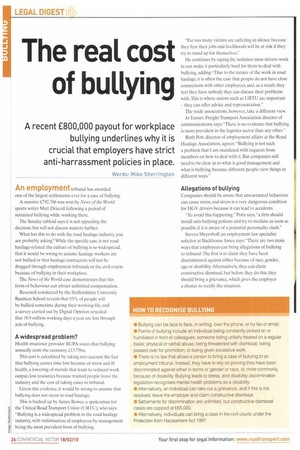The real cost of bullying
Page 26

Page 27

If you've noticed an error in this article please click here to report it so we can fix it.
A recent E800,000 payout for workplace bullying underlines why it is crucial that employers have strict anti-harrassment policies in place.
Words: Mike Sherrington
An employment tribunal has awarded one of the largest settlements ever for a case of bullying.
A massive £792,766 was won by News of the World sports writer Matt Driscoll following a period of sustained bullying while working there.
The Sunday tabloid says it is not appealing the decision, but will not discuss matters further.
What has this to do with the road haulage industry, you are probably asking? While the specific case is not road haulage-related, the culture of bullying is so widespread, that it would be wrong to assume haulage workers are not bullied or that haulage contractors will not be dragged through employment tribunals or the civil courts because of bullying in their workplace.
The News of the World case demonstrates that this form of behaviour can attract unlimited compensation.
Research conducted by the Staffordshire University Business School reveals that 53% of people will be bullied sometime during their working Life, and a survey carried out by Digital Opinion revealed that 18.9 million working days a year are lost through acts of bullying.
A widespread problem?
Health insurance provider BUPA states that bullying annually costs the economy £13.75bn, This cost is calculated by taking into account the fact that bullying causes time lost because of stress and ill health, a lowering of morale that leads to reduced work output, lost resources because trained people leave the industry and the cost of taking cases to tribunal.
Given this evidence, it would be wrong to assume that bullying does not occur in road haulage.
This is backed up by James Bower, a spokesman for the United Road Transport Union (URTU), who says: "Bullying is a widespread problem in the road haulage industry, with victimisation of employees by management being the most prevalent form of bullying, "Far too many victims are suffering in silence because they fear their jobs and livelihoods will be at risk if they try to stand up for themselves."
He continues by saying the isolation most drivers work in can make it particularly hard for them to deal with bullying, adding: "Due to the nature of the work in road haulage, it is often the case that people do not have close connections with other employees, and, as a result, they feel they have nobody they can discuss their problems with. This is where unions such as URTU are important — they can offer advice and representation."
The trade associations, however, take a different view.
Jo Tanner, Freight Transport Association director of communications, says: "There is no evidence that bullying is more prevalent in the logistics sector than any other."
Ruth Pott, director of employment affairs at the Road Haulage Association, agrees: "Bullying is not such a problem that I am inundated with requests from members on how to deal with it. But companies still need to be clear as to what is good management and what is bullying, because different people view things in different ways."
Allegations of bullying
Companies should be aware that unwarranted behaviour can cause stress, and stress is a very dangerous condition for HGV drivers because it can lead to accidents.
"To avoid this happening," Potts says, "a firm should install anti-bullying policies and try to mediate as soon as possible if it is aware of a potential personality clash."
Steven Meyerhoff, an employment law specialist solicitor at Backhouse Jones, says: "There are two main ways that employees can bring allegations of bullying to tribunal. The first is to claim they have been discriminated against either because of race, gender, age or disability. Alternatively, they can claim constructive dismissal, but before they do this, they should bring a grievance, which gives the employer a chance to rectify the situation.
"To try to reduce the risk of being taken to a tribunal. employers should develop a robust anti-bullying policy that states anyone found guilty of bullying will be guilty of gross misconduct, which could lead to dismissal.'"
Legat concept
Dermott Thomas, a partner at transport law firm Barker Gote lee, adds: "There is no legal concept of bullying. but workplace bullying can lead to claims of harassment and discrimination.
"I once dealt with a case involving a black worker where the bullying was not always face to face, but the treatment of this individual included other members of staff making racist comments in the canteen, which undermined his standing."
He adds: "The best way of dealing with any potential problem with bullying is to nip it in the bud as quickly as possible by, hopefully, getting both parties to talk to each other to resolve the situation. Otherwise, you could get a case like that of the News of the World journalist who was able to bring a disability discrimination claim that led to his extremely large payout."
However, financial considerations should not be the only reason for stamping out bullying.
Employers have a duty of care to their staff under the 1974 Health and Safety at Work Act, and they should seek to develop a harmonious working atmosphere, not just for the welfare of their staff, but also because it promotes a productive environment.
































































































































